|
|
|
Sort Order |
|
|
|
Items / Page
|
|
|
|
|
|
|
| Srl | Item |
| 1 |
ID:
186149
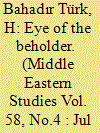

|
|
|
|
|
| Summary/Abstract |
The leader of the Kurdistan Workers’ Party (Partiya Karkerên Kurdistan or PKK), Abdullah Öcalan, is a controversial figure. Since the founding of the PKK in 1978, Öcalan has been the ultimate decision-maker in the organization. He resumed his role in the PKK and his influence over his followers after his imprisonment in 1999. The current study aims to analyze Öcalan’s views on Turkish political history. To accomplish this goal, the study focuses on Öcalan’s reading of Turkish political history before and after his imprisonment on İmralı in 1999. Seeking to demonstrate the differences and similarities in Öcalan’s approach to Turkish political history during these two periods, the study argues that Öcalan’s reading of Turkish political history provides insight into his political thought. Furthermore, the fluctuations in his reading of this history are also a byproduct of Öcalan’s attempt to rethink the Kurdish question and the position of the PKK.
|
|
|
|
|
|
|
|
|
|
|
|
|
|
|
|
| 2 |
ID:
186147
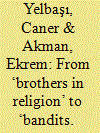

|
|
|
|
|
| Summary/Abstract |
This article analyses the mass migration of Chechens to the Ottoman Empire between the mid-1860s and the 1900s. The Russian expansion to the North Caucasus transformed the entire region surrounding the Black Sea, including its demography, governance and politics. This expansion took place in several phases. The first resulted in a major mass migration by several North Caucasian groups, who abandoned the region in response to the increasing presence of Russian military personnel. During the second stage, the exodus of these groups accelerated because of massacres committed by the Russian military in an attempt to take complete control. Many North Caucasians were exiled to Ottoman lands, arriving en masse, either on foot, or by sailing across the Black Sea.
|
|
|
|
|
|
|
|
|
|
|
|
|
|
|
|
| 3 |
ID:
186153
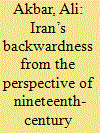

|
|
|
|
|
| Summary/Abstract |
Contemporary Iranian scholars’ ideas about their country’s ‘backwardness’ have their roots in nineteenth-century Iranian intellectualism. This article introduces four prominent Qajar era thinkers and traces their perceptions of the reasons for Iran’s ‘backwardness’ and their solutions to overcome it. In addition to Iranian intellectuals’ admiration of modern science, the article identifies and examines four prominent aspects of nineteenth-century thought on the miserable situation of Iran and strategies for national progress: despotism and lawlessness in Iran; the Arab invasion of Persia; Islam in general and the Shiʿa ulama in particular; and the need for alphabet reform. This article shows that while elements of nineteenth-century intellectuals’ ideas are questionable, their legacy persists in contemporary Iranian scholarship.
|
|
|
|
|
|
|
|
|
|
|
|
|
|
|
|
| 4 |
ID:
186156
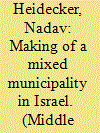

|
|
|
|
|
| Summary/Abstract |
This article discusses the birth of the municipality in the city of Acre after the 1948 Arab-Israeli War. Hitherto a predominantly Arab city, Acre became a mixed city following the Palestinian exodus and the Jewish immigration wave. However, despite the sizable Jewish community, Acre, like other Arab-majority cities in the newly-established Jewish State, was placed under military rule. The article examines archival material to draw out the local power struggles in Acre until the lifting of the military rule in the city and the election of its first mayor in October 1951 and explores the intricate interrelations between the local actors and the central government. Acre thus serves as a case study for an analysis of the tactics used by Mapai, Israel’s ruling party, to combat its political rivals in the Arab sector—most notably the Israeli Communist Party—and exert its hegemony over Israel’s Arab minority.
|
|
|
|
|
|
|
|
|
|
|
|
|
|
|
|
| 5 |
ID:
186146
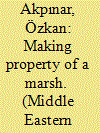

|
|
|
|
|
| Summary/Abstract |
This article discusses the contested character of property rights with respect to reclaimed land from marshes in the Ottoman Empire through the reclamation project for Lake Lapsista in Ottoman Ioannina starting from 1886. By the end of the nineteenth century, many marshes, lakes, and rivers in the Ottoman territories were planned to be cleaned and reclaimed for various purposes. However, as a result of reclamation projects, the possession of reclaimed land, and the way such lands were defined, became a vexed issue in which various actors became involved and struggled over controlling them. Focusing on struggles and negotiations the reclamation project created, the article aims to uncover how the ownership of reclaimed marshy regions were defined at the local level. Drawing on archival materials on the land dispute over the reclaimed Lake Lapsista from 1886 to 1909, the article shows that the struggle over control of the reclaimed land manifested itself in the attempts of both central and local actors to circumvent legal boundaries or manipulate legal regulation and codes at the local level, challenging approaches that only focus on legal texts and codes.
|
|
|
|
|
|
|
|
|
|
|
|
|
|
|
|
| 6 |
ID:
186155


|
|
|
|
|
| Summary/Abstract |
During the Iran-Iraq war the Mojahedin-e Khalq Organization (MeK or MKO) with its own army, the National Liberation Army of Iran (NLAI), fought side by side with Iraq’s leader. The organization, which showed determination, belief in its goals and unity and achieved several successes in the battlefield had a main, but not final, goal which was to cause the exhausted Iranian Army to collapse − so that the NLAI could then conquer Iran and replace the ‘corrupt regime’ of the Ayatollahs. By providing an understanding of how an ethos can be created, this article describes how an oppositional group’s narrative can transport it from its wishful thinking about winning a battle of the few against the many (which was objectively deemed to be impossible) to the bitter, actual result of total defeat. The article shows how the Mojahedin, by unapologetically siding with Saddam, fought against all odds with the sole result being the creation of a mythos-ethos which would replace that of ex-patriot nationalism. The Mojahedin’s defeat would ultimately translate into a new national-religious ethos in which the Imam Hossein’s fight in Karbala would be commemorated as fighting for the ‘real Islam’.
|
|
|
|
|
|
|
|
|
|
|
|
|
|
|
|
| 7 |
ID:
186150


|
|
|
|
|
| Summary/Abstract |
This article examines motivational factors that push and pull Turkish citizens to join ISIS, based on a content analysis of 132 interviews. The four push factors revealed in the analysis are socioeconomic conditions, lack of meaningfulness, social exclusion, and personal trauma, while five pull factors are material incentives, Kurdistan Worker’s Party (PKK) rhetoric, opposition to al-Assad’s regime, discourse of redemption, and declaration of the caliphate. There are two main findings: first, terrorist organizations abuse society’s tolerance of religious groups, and second, Turkey’s Syrian foreign policy as well as the actions of groups linked to PKK are both influential.
|
|
|
|
|
|
|
|
|
|
|
|
|
|
|
|
| 8 |
ID:
186151
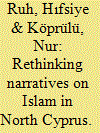

|
|
|
|
|
| Summary/Abstract |
North Cyprus, which has experienced perennial conflict since 1963, has recently been witness to heated debates revolving around the role of Islam in making and re-configuring Turkish Cypriots’ social and political landscape. The reason behind such debates derives from the historical narrative established on a Kemalist-secular understanding of religion among the Turkish Cypriot community vis-à-vis the conservative-Islamist narrative. This article is an attempt to analyse and explore the role of religion in the Turkish Cypriot community and how these two established narratives have, in recent times, come under discussion with the ascendancy of the Justice and Development Party in neighbouring Turkey. Within this context, this article will explore the roots and reflections of these two key narratives on politics and society in North Cyprus, and will argue that the recent public debates among the secular and Islamist Turkish Cypriot elites are not very new, only external dynamics have become more influential nowadays. As a corollary, we will also scrutinise the role of religion through semi-structured interviews conducted with key political elites, opinion leaders and Turkish migrants’ associations in North Cyprus.
|
|
|
|
|
|
|
|
|
|
|
|
|
|
|
|
| 9 |
ID:
186152
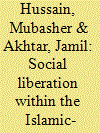

|
|
|
|
|
| Summary/Abstract |
This article presents a detailed study of the Ahl-i-Hadith movement in Pakistan and shows how its scholars continue to rely heavily on religious discourses and texts produced by official Saudi Salafi scholars. The authors illustrates this by showing how Pakistani Ahl-i-Hadith scholars actively refer to the fatwas issued by Saudi scholars. Further, based on interviews with both senior and younger scholars, they show that most of them, while somewhat troubled by the changes occurring within Saudi Arabia, are inclined to follow whatever direction the Saudi religious establishment adopts. Thus, in the view of the authors, social liberation within Saudi Arabia will trigger similar changes in attitude within this movement. The article, however, also highlights the need to recognize that the Ahl-i-Hadith movement represents a very small, though influential, group within the broader Pakistani religious sphere, which is dominated by Deobandi and Barelvi networks. Thus, it should not be assumed that the existence of Salafi groups in a country means that Salafism constitutes the dominant Islamic force in that context.
|
|
|
|
|
|
|
|
|
|
|
|
|
|
|
|
| 10 |
ID:
186157
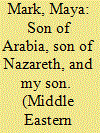

|
|
|
|
|
| Summary/Abstract |
This article focuses on the campaign waged by Herut, a right-wing National-Liberal party and its leader, Menachem Begin, to abolish the Military Government imposed on the Arab citizens of Israel between the years 1948-1966. The article draws on multiple sources that have not yet been studied to analyze Herut’s struggle for the annulment of the Military Government, while placing it in a broad historical and political context. It shows that Herut derived certain political benefits by campaigning for the annulment of the Military Government. However, it also establishes that Herut paid a price for its campaign, suffering criticism from within the right-wing political camp and wrestling with allegations from the left-wing political camp. The analysis of Herut’s campaign for the annulment of the Military Government illuminates the liberal ideological foundations of the movement that has held sway in Israel for over four decades, affirming its commitment to liberal values, and the belief of its founding father, Begin, in civic equality between Jews and Arabs in Israel.
|
|
|
|
|
|
|
|
|
|
|
|
|
|
|
|
| 11 |
ID:
186148
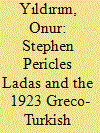

|
|
|
|
|
| Summary/Abstract |
This article focuses on the narrative of the 1923 Greco-Turkish Exchange of Populations with a focus on the role of a prominent figure in the making of this narrative, namely, Stephen Pericles Ladas. His 89-year-old book is still considered the standard text on the event and is unsurpassed in terms of its coverage of facts and figures. The article contextualizes and briefly examines this highly influential text on the Exchange of Minorities with a view to showing how it came to constitute the dominant narrative of the Greco-Turkish Exchange of Populations. It is argued that Ladas appropriated the findings and arguments about this event from the publications of his contemporaneous Greek intellectuals and then framed them within the parlance of international law to craft a narrative favorable to the nation-state and the League of Nations. In the absence of any challenging opinions and publications, this narrative, which was largely inattentive to the human and moral consequences of the event, became the standard account of the Greco-Turkish case to be widely quoted by the international political and scholarly circles preoccupied with the question of ethnic, religious and linguistic minorities during the interwar period and after.
|
|
|
|
|
|
|
|
|
|
|
|
|
|
|
|
| 12 |
ID:
186154
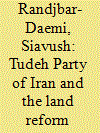

|
|
|
|
|
| Summary/Abstract |
This article seeks to explore the reaction and attitude of the Tudeh Party of Iran to the land reform initiatives enacted by the Pahlavi state between 1958 and 1964. This article will in particular describe how the party analysed the various stages of the land reform programme through both its lively media operation and internal party documents. Based on a close reading of this material, this article will also focus on how the exiled party’s attitude with regards to the Pahlavi state and other contemporary political actors affected its opinion of the rise to prominence of Ayatollah Ruhallah Khomeini in the midst of the land reform programme. The article will hence conclude by offering a new account of the Tudeh’s initial attitude to Khomeini’s initiatives from the 15 Khurdad uprising to the cleric’s exile and gauge the extent to which the same was informed by the previous analysis of the land reform initiatives.
|
|
|
|
|
|
|
|
|
|
|
|
|
|
|
|
| 13 |
ID:
186145


|
|
|
|
|
| Summary/Abstract |
In the late nineteenth and early twentieth centuries, the style of Ottoman textiles underwent a remarkable shift. This study examines this shift through the case of the Hereke Imperial Factory, a showcase of Ottoman modernism, from the factory’s foundation to the run up to the First World War. In this study, I draw on Ottoman archival records and sources found at the Hereke factory library to show how the style of the textiles produced at the factory was gradually ‘nationalized’ under the reigning political ideology of the day. I also argue that the evolving styles produced by the designers at the Hereke factory were not merely a reflection of the political culture of the era but also, and more significantly, an active factor in shaping that culture. When creating their designs, the designers at Hereke consciously sought to revive the past, and over time, I show, the aspects of the past they embraced for this purpose changed in important ways, gradually shifting from European-style ornamentation to more ‘authentic’ Ottoman styles that were in reality an entirely new synthesis of earlier Eastern designs. That is, designers effectively created a self-consciously ‘Ottoman style’ for the first time, paralleling the efforts of the empire around them to forge a modern imperial identity. I devote particular attention to Tovmas Effendi, an Armenian painter and Hereke’s chief draftsman, to demonstrate how the idea of Ottomanism crystalized in carpet design.
|
|
|
|
|
|
|
|
|
|
|
|
|
|
|
|
|
|
|
|
|